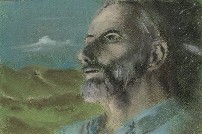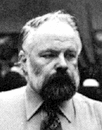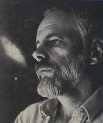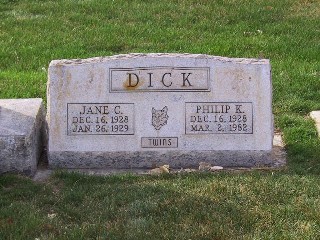Philip K. Dick lived most of his life in California. He was born in 1928 in Chicago. In his career PKD wrote 36 novels and five short story collections between 1952 and 1982 when he died in Santa Ana, California.
 A Scanner Darkly was dedicated to many of his friends who died or suffered damage from drug abuse (including himself). The first person narration of Radio Free Albemuth is written from the perspective of a young science fiction writer named Philip who lives in Berkeley. Many insights into Dick’s view of his world are available here. These include his distrust for government and authority, his life as a professional writer and even cosmic visions he is said to have experienced. The novels of the Valis trilogy continue to blur the lines between fiction and Dick’s twisted reality.
A Scanner Darkly was dedicated to many of his friends who died or suffered damage from drug abuse (including himself). The first person narration of Radio Free Albemuth is written from the perspective of a young science fiction writer named Philip who lives in Berkeley. Many insights into Dick’s view of his world are available here. These include his distrust for government and authority, his life as a professional writer and even cosmic visions he is said to have experienced. The novels of the Valis trilogy continue to blur the lines between fiction and Dick’s twisted reality.
 Dick’s emotional state went through many changes throughout his life. The death of his twin sister 41 days after their birth is the first of many scars Dick would face. He would be involved in a string of bad marriages and was addicted to drugs. His level of output was inconsistent and he would experience periods of intense creativity and dark times where he wouldn’t write. Throughout the 1950’s Dick was beginning to make a name for himself in the science fiction world. He was writing stories for science fiction magazines and developing his own unique style that was different than the other sci-fi writers of the time. His first published novel was Solar Lottery in 1954. The political climate of the times and Dick’s own paranoia involving the authority he wrote about created the atmosphere from where many of his stories would emerge.
Dick’s emotional state went through many changes throughout his life. The death of his twin sister 41 days after their birth is the first of many scars Dick would face. He would be involved in a string of bad marriages and was addicted to drugs. His level of output was inconsistent and he would experience periods of intense creativity and dark times where he wouldn’t write. Throughout the 1950’s Dick was beginning to make a name for himself in the science fiction world. He was writing stories for science fiction magazines and developing his own unique style that was different than the other sci-fi writers of the time. His first published novel was Solar Lottery in 1954. The political climate of the times and Dick’s own paranoia involving the authority he wrote about created the atmosphere from where many of his stories would emerge.
 The 50’s and the early 60’s were very creative periods for Dick. He won the highest award in the science fiction world in 1962 for The Man In The High Castle. The 1970’s produced some of Dick’s best work and he continued to become well known in the science fiction community. Books such as Do Androids Dream of Electric Sheep, Flow My Tears The Policeman Said were written in this time period (late 60’s, early 70’s). The profound experience Dick refers to as 2-3-74 becomes a turning in his career and emotional stability. This event which is fictionalized in The Valis Trilogy is a series of contacts Dick claims to have had with a force beyond Earth. Called Zebra, at first (then Valis), these contacts would leave Dick speculating until his death in 1982.
The 50’s and the early 60’s were very creative periods for Dick. He won the highest award in the science fiction world in 1962 for The Man In The High Castle. The 1970’s produced some of Dick’s best work and he continued to become well known in the science fiction community. Books such as Do Androids Dream of Electric Sheep, Flow My Tears The Policeman Said were written in this time period (late 60’s, early 70’s). The profound experience Dick refers to as 2-3-74 becomes a turning in his career and emotional stability. This event which is fictionalized in The Valis Trilogy is a series of contacts Dick claims to have had with a force beyond Earth. Called Zebra, at first (then Valis), these contacts would leave Dick speculating until his death in 1982.
Philip K. Dick has been given many labels over the years and as his work has become more known since his death. The genre of science fiction was used as an outlet to break unfamiliar ground. His work is very experimental and questions the basis of our own existence. His own emotional and psychological states play a major role in the tone of his work throughout the years. Noticing the change in Dick’s writing style from the 50’s to the 80’s is a look at the struggles of a creative genius. His attempts to demonstrate the ever-expanding potential of the universe are personal journeys into his own realities.
 The twenty first century has seen a surge of interest in Philip K. Dick, whose stories have inspired generations of readers, film lovers and artists of all kinds. His books and stories are in print in dozens of languages and his works are studied in university classrooms. The legacy of Philip K. Dick is stronger than ever, his seemingly prescient views of the future are more real than he could have ever imagined. This web site is a loving tribute to the man and his work from his fans. It may not be the fanciest site on the Internet but we hope the content speaks louder than the form.
The twenty first century has seen a surge of interest in Philip K. Dick, whose stories have inspired generations of readers, film lovers and artists of all kinds. His books and stories are in print in dozens of languages and his works are studied in university classrooms. The legacy of Philip K. Dick is stronger than ever, his seemingly prescient views of the future are more real than he could have ever imagined. This web site is a loving tribute to the man and his work from his fans. It may not be the fanciest site on the Internet but we hope the content speaks louder than the form.
In this site you will find info, insights and more about one of the world’s greatest and most fascinating science fiction authors and philosophers. In a Philip K. Dick story you can find many elements of paranoia, psychosis, schizophrenia, hallucination and more. PKD’s stories take the reader on a intense journey through many human emotions.
 His prophetic views about the future written in the fifties, sixties and seventies give his novels an air of believability and urgency. PKD at his best places his readers in situations where reality is not clearly defined. He explores the power of the brain and many human concepts of life, death, religion and love in a dark setting that creates a provocative view of the world as we know it. His writing is very much a product of the cultural activity which was occurring during his lifetime and he uses many elements from the world around him. His own personal experiences play a major role in his writing as well.
His prophetic views about the future written in the fifties, sixties and seventies give his novels an air of believability and urgency. PKD at his best places his readers in situations where reality is not clearly defined. He explores the power of the brain and many human concepts of life, death, religion and love in a dark setting that creates a provocative view of the world as we know it. His writing is very much a product of the cultural activity which was occurring during his lifetime and he uses many elements from the world around him. His own personal experiences play a major role in his writing as well.
Philip K. Dick obituary in the New York Times
(Original Link: Philip K. Dick obituary in the New York Times, The New York Times, March 3, 1982)
DIED. Philip K. Dick, 53, prolific, sometimes visionary science-fiction writer, whose multilayered stories probed the discrepancies between illusion and reality; of a stroke; in Santa Ana, Calif. The characters in his 50 novels (Flow My Tears, the Policeman Said) were often ordinary people trapped in extraordinary circumstances whose distorted perceptions prevented them from realizing their own dilemmas. The task of the science-fiction writer, said Dick, “is creating multiverses, rather than a universe.”
Source: Time Magazine: March 15, 1092, p. 92.
Philip K. Dick, 54, award-winning author of 35 science-fiction novels and six short-story collections; of complications following a stroke, in Santa Ana, Calif., March 2. Dick, whose works are distinguished by deftly crafted, believable characters trapped in an uncertain world, won the 1962 Hugo Award – voted on by American scifi fans – for his novel “The Man in the High Castle.”
Source: Newsweek: March 15, 1982, p. 87.
Here are links to various biographies for starters.
Wikipedia
http://en.wikipedia.org/wiki/Philip_K._Dick
Internet Movie Database
http://www.imdb.com/name/nm0001140/bio
Bio Channel
http://www.biography.com/people/philip-k-dick-9274047
Radio Free Albemuth movie site
http://www.radiofreealbemuth.com/blog/?page_id=1392
The Biography Project
http://www.popsubculture.com/pop/bio_project/philip_k_dick.html
Hermenaut
http://www.hermenaut.com/a4.shtml
For people seeking more in-depth information, I recommend Lawrence Sutin’s “Divine Invasions: A Life of Philip K. Dick
” which is the first PKD biography I read and I believe it’s fairly readily available.

I thought I read that PKD was somehow involved with, or at least had strong opinions about, “Drake’s Plate of Brass,” the brass engraving supposedly found in the 1930s at Drake’s Bay in California and thought to have been left by Sir Francis Drake at the site of his landing there (or wherever) in the 16th century but now widely considered a forgery. I realize that Drake reported leaving such a plate and that it appears in Dr. Futurity and its predecessor short story, but I thought I read there was more of a story than that about PKD’s connection to the plate left by Drake or the object believed for years to be that plate…??
Just dropped by. I’ve many books by PK Dick and I’ve been a long time fan since the mid 70’s. Don’t get me wrong when I say I don’t consider him a great author (I’ve more to say on this at: http://tparchie.wordpress.com/2014/03/12/philip-k-dick-again/) however I contend that he was a visionary. Well read and articulate, he took the reader places that few others could even dream of. We will be working out his legacy for years to come.
Where was Philip K Dick living when he had his 2-3-74 experience?
Thanks for your website
Where was Philip K Dick living when he had his 2-3-74 experience???
Thanks
Philip will always be missed.
By conincidence I identified this author of so many outstanding science-fiction movies in the past 40 years. I could not imagine that it was this author’s creativity shining through all these movies. I enjoyed blade runner and total recall a lot. I feel that it’s the authors’ creativity, matched by a carefully-adapted screen-play and by suitable film directors and actors, that transform the authors’ genius into a mind-boggling imagination for a large audience.
Unfortunately the author’s could not earn their living appropriately just by their work.
It’s the film industry who “refines” the ideas into a media product that earn the most bringing the ideas to a wide audience. This just a fact without assessment.
About this, I feel sad for many genius authors, that cannot earn the reward of their work and creativity during their life-time, being “ahead” of the zeitgeist and needing a third party for the carving the rough diamond to be processed to shine. And when it shines only, then the public and the masses recognize the huge talent.
I was wondering if already a screen-play has been written for the martian time-slip.
I feel, that most of Dicks’ “unexplored” content is really suitable for the film business, that lacks currently of new ideas and creativity, which this author’s work definitely contains. It is a hard work to transform and bring the diamonds not seen yet to shine. I feel with Philip K. Dick, it’s really worth the effort.
Check out the Prime original series “Electric Dreams”.
The series is what has brought me here. Remarkable to say the least
Just curious if anyone might know the actual specific condo number of PKD’s last address in Santa Ana?
Maybe not best, but my favorite.